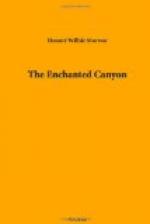Havisham shook his head. “You’d better let him alone, Huntingdon. He has an awful weapon in his papers and he can smear you in the public mind no matter how obviously false his stories may be.”
Enoch’s lips tightened. “I’m not afraid of Brown. But all things considered, Havisham, you’d better leave me out of your list of presidential possibilities.”
“There is no list! Or, at least, you’re the list!” The Senator’s laugh was a little rueful.
“And,” Enoch went on, “strange as it may seem, I’m not sure that I want the Presidency. It seems to me that I might be far more useful in the Capitol than in the White House.”
“Not to the party!” exclaimed Havisham quickly.
“No, to the country!”
“Perhaps, but it’s a debatable matter, which I don’t intend to debate. You are our man. If you won’t deny the Brown canard, then we must go ahead without the denial.”
Enoch looked thoughtfully from the window, then turned back to the Senator. “There is no great hurry, is there? Give me a month to get matters clear in my own mind.”
“There is no hurry, except that the Brown papers work while others sleep, and Fowler is Brown’s nominee. However, take your month, old man. I don’t doubt that you have troubles of your own!”
Enoch nodded. Havisham shook hands heartily and departed, and the Secretary turned to his loaded desk. The Alaskan situation was causing him keen anxiety. The old war between private ownership, with all its greed and unfairness to the common citizen, and government control, with all its cumbersome and often inefficient methods, had reached acute proportions in the great northern province. Enoch was faced with the necessity of deciding between the two. It must be a long distance decision and any verdict he rendered was predestined to have in it elements of injustice. For days Enoch thrust, as far as possible, his personal problem into the background while he struggled with this greater one. It was only at night that the thought of Diana overwhelmed all else to torture him and yet to fill him with the joy of perfect memories.
It was on the morning after he had given his Alaskan decision that Charley Abbott, eyebrows raised, laid a Brown paper before the Secretary, with the comment:
“Either Cheney or some one in Cheney’s office has leaked.”
It was a twisted story of Curly’s death. Curly, according to this version, had been doing his utmost to keep two Survey men, Harden and Forrester, from hogging for obscure government purposes, certain oil lands, belonging to Curly. In the ill feeling that had resulted, Curly had been shot. Before his death, however, he had been able to write a statement of the affair which had been sent to a well-known lawyer in Washington. He also had left sufficient property to the lawyer to enable him to expose the workings of the Geological Survey to its bones.




